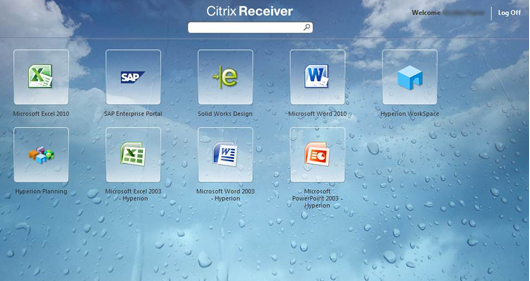VMware, Citrix on virtual desktop collision course

VMware is increasingly eyeing Citrix's virtual desktop turf as it moves beyond being a one-trick data center pony. Citrix, however, is a very formidable foe. The duel for your increasingly skinny, cloud-enabled desktop should be interesting to watch.
In recent months, VMware has been buying up parts to focus on the virtual desktop. VMware bought Socialcast this week to add to its Sliderocket and Zimbra acquisitions. Combine those parts with the Horizon App Manager and it's clear that VMware has some serious desktop ambitions.
The problem for VMware is that Citrix has been on the desktop as a virtualization play well before it was cool. Now Citrix is leveraging that experience in bringing the Windows environment to thin clients to expand into mobile. Citrix's Receiver app is a popular vehicle to bringing desktops to any device---phone, tablet, Google Chromebook.
VMware wants part of that pie, but seems to be playing from behind. Citrix had its Receiver ready shortly after Apple's iPad launched. Now Citrix is running on every tablet platform. VMware was late to that party. Citrix was a headline partner at Google's Chromebook launch with an HTML 5 Receiver interface. VMware is also a partner of Google for the Chromebook, but just got a passing mention.
If you flip the Citrix-VMware duel. VMware dominates the backend data center architecture. The company has parlayed its hypervisor into a dominant position. Citrix is also playing the back-end game, but is largely considered an underdog to VMware.
In the end, you have two companies coming to the same spot from different ends of the enterprise spectrum. The revenue tally goes to VMware. After all, the data center is one lucrative market. VMware is expected to deliver 2011 revenue of $3.63 billion, according to Wall Street. Citrix is expected to have sales of $2.16 billion for 2011.
On earnings conference calls, Citrix has repeatedly highlighted strength on the virtual desktop front. VMware is now talking virtual desktop infrastructure (VDI) up, but Citrix-envy seems evident.
For instance, Raghu Raghuram, VMware's senior vice president of virtualization and cloud platforms, spoke at a Bank of America Merrill Lynch conference this week. VDI was front and center. BofA analyst Kash Rangan asked a question that set Raghuram off a bit. Here's the edited play by play:
Rangan: Citrix was here just before the VMware presentation, and they talked about a significant increase in the pipeline for VDI, and it doesn't look like they're at least viewing VMware competitively just as yet. Maybe you could talk about, just since you touched upon VDI as a source of enterprise license growth, where are you in the VDI market? What are the things that we should be looking for, for VMware to be more noticed by competitors? Maybe you're seeing that pickup in your business, but when are we going to start to hear more about this as a mainstream thing for VDI?
Raghuram: We are already seeing a fairly significant ramp-up in both the CIO level interest and in implementation-level deployments. And it's continuing to ramp up fairly significantly for us. The factors that are driving it are fairly secular in the sense it's not related to just one competitor. It's got to do with providing anywhere access to Windows desktops. It's got to do with the falling costs of the back-end infrastructure, the heightened interest in security and manageability.
With respect to our own product line, we've been fairly focused on a couple of areas of our technology. The first one is the back end, where we continue to make significant advances in increasing the manageability and decreasing overall cost of run of the VDI solution. And then secondly, in terms of the front-end protocol, which we have revved very rapidly, and it continues to rev, you can expect it to rev even faster in the days ahead.
The VMware exec then said the company was positioning for the post-Windows era, which means moving legacy Microsoft to the data center and moving it to any device.
Rangan then noted that Citrix has been in the VDI game longer and asked what VMware had in store to leapfrog its rival.
Raghuram:
So if the server virtualization market is still in its early stages, the desktop virtualization market is in its infancy. So what Citrix has done really well is gone to their customers that are using Presentation Server and presented VDI as an adjunct solution to that. And that certainly gave them a measure of success in that marketplace.
VMware's plan revolves around making VDI an extension of data center efforts.
Just before Raghuram's talk, Citrix's sales and services chief Al Monserrat noted that C-level execs are indicating that VDI is mainstream. Monserrat the conversations with C-level execs revolves around "desktop virtualization and people's desire to provide desktops in a virtual way and take advantage of either new devices and the ability to work from any kind of device."
Monserrat also noted that VMware hasn't been a factor in Citrix's VDI deals:
On the VMware side, when I looked at the top 20 deals that I had here at the end of the year at the end of Q1, VMware was a nonfactor. So it was not something I had to overcome to close a deal in neither one of those two quarters.
VMware's challenge is to make Citrix sweat a little on the VDI side. It won't be easy though.
Related:
